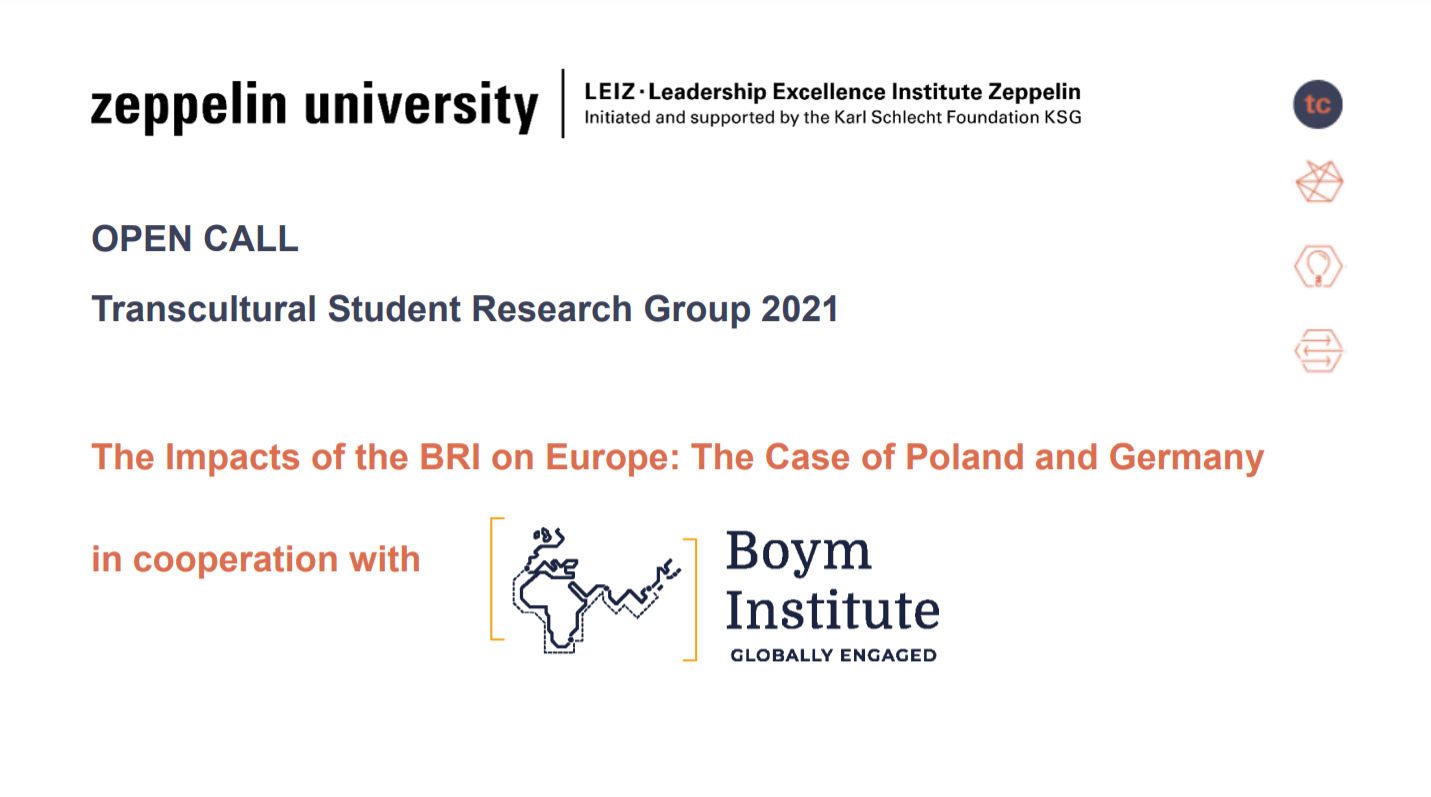
OPEN CALL
Transcultural Student Research Group 2021
The Impacts of the BRI on Europe: The Case of Poland and Germany in cooperation with The Boym Institute
Looking for a topic for your Humboldt, Elinor Ostrom, Bachelor or Master Thesis?
Interested in thinking about “The Impacts of the Belt and Road Initiative in Europe”?
Keen on cooperation with international peers?
Motivated to become part of the LEIZ’ project “Transcultural Caravan” and to join an interdisciplinary research group?
Can’t wait to publish your first chapter in a scientific book?
If you answered at least two of these questions with “yes”, we look forward to receiving your application! For further information on the application process, please see the corresponding section in this document.
Transcultural Student Research Group | TSRG 2021
The Impacts of the Belt and Road Initiative on Europe: The Case of Poland and Germany
As an ambitious project, the Belt and Road Initiative creates global value chains in a network that connects Europe, Asia, and Africa and that is characterised by diversity in languages, traditions, values, as well as political, social, and economic systems and settings. As one of the most fascinating and risky developments driving the formation of a global society, this initiative represents a global economic, political, social, and cultural experiment with potentially beneficial but also potentially disruptive consequences for all involved.
Against this background, it is important to contribute to the understanding of what the New Silk Road can mean in economic, political, leadership and cultural terms for the European countries involved. This analysis should reveal the practical consequences of the Belt and Road Initiative for Europe in the case of Poland and Germany, as well as their respective social effects.
The following topics are possible for the sub-research projects:
- Economic impacts: international economy, business, logistic & transportation, innovation & technology, the impacts of COVID-19, international trade and investment, global value chains, value creation networks.
- Socio-cultural impacts: transculturality, gender equality, arts, academia, media & communication, civil society organizations.
- Political impacts: geopolitical impacts, bilateral relations vs. multilateral relations, 17+1, EU policy, para-diplomacy.
- Leadership: relational leadership, transcultural leadership, cross-sectoral leadership, organization and management culture.
Timeframe
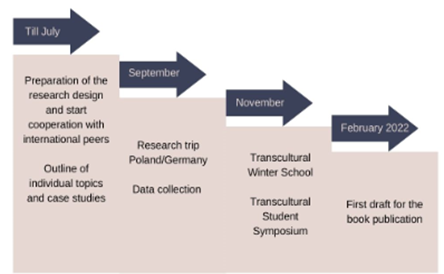
Starting in May, all TSRG 2021 participants will conceptually develop specific research questions that correlate both with their disciplinary background and with the TSRG 2021 overall research topic, together with experts at LEIZ and The Michał Boym Institute for Asian and Global Studies, as well as individual supervisors (ZU professors). Subsequently, the students will work on these questions together with students from Poland in an academic co-authoring process.
Accordingly, the group consists of several such pairs, who apply the common questions to their respective case studies and disciplines and exchange on their experiences and findings within the group. The case study research includes interviews and field research realized in the pairs and in cooperation with local universities and cooperation partners.
First results of the studies may be presented during the Transcultural Winter School 2021. After having submitted their individual Humboldt, Elinor Ostrom, Bachelor or Master theses, a joint book from all involved students will be published in the “Transcultural Management Series” at Metropolis Publisher.
Application
Interested Polish students from all study programs are welcome and can apply for the TRSG until April 12,2021. To apply for the TRSG 2021, please send an email with your CV and Cover Letter to the Head of the Michał Boym Institute for Asian and Global Studies Patrycja Pendrakowska (ppendrakowska@instytutboyma.org). Please take into consideration that for working on this research project you should reserve around 10 hours per week and be able to take part in research trips to Germany and Poland. We welcome Bachelor and Master students, as well as PhD Candidates.
Team
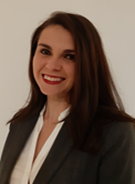
Jessica Geraldo Schwengber
Research fellow at “Transcultural Competences“ Research Group, Project Manager of the Transcultural Caravan
Leadership Excellence Institute Zeppelin | LEIZ
Phone +49 7541 6009 2265
Fax +49 7541 6009 1299
jessica.schwengber@zu.de

Dr Julika Baumann Montecinos
Head of Research Group “Transcultural Competences”, Project Manager of the Transcultural Caravan
Leadership Excellence Institute Zeppelin | LEIZ
Phone +49 7541 6009 2264
Fax +49 7541 6009 1299
julika.montecinos@zu.de

Prof Dr Josef Wieland, Vice President (Research)
Director Leadership Excellence Institute Zeppelin | LEIZ
Chair of Institutional Economics, Organisational Governance, Integrity Management and Transcultural Leadership
Phone +49 7541 6009 2261
Fax +49 7541 6009 1299
josef.wieland@zu.de

Katharina Hahn
Project coordinator
k.hahn@zeppelin-university.net
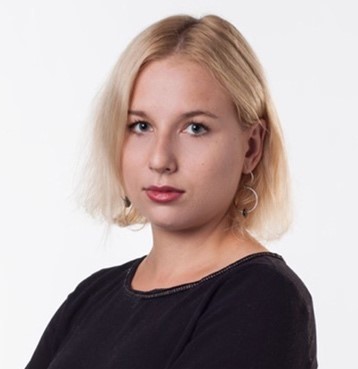
Patrycja Pendrakowska
Head of the Boym Institute
ppendrakowska@instytutboyma.org
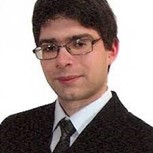
Paweł Behrendt
Member of the Board at the Boym Institute
pbehrendt@instytutboyma.org
For further information:
www.zu.de/leiz
www.transcultural-caravan.org
czytaj więcej
Border conflicts as political tools: the Thailand–Cambodia crisis
The border conflict between Thailand and Cambodia is much more than just a territorial dispute. Rooted in historical ambiguities, it has become a tool for domestic political maneuvering in both countries and a stage for international strategic competition.
Andżelika SerwatkaCoronavirus outbreak in Poland – General information and recommendations for entrepreneurs
Kochański & Partners and the Boym Institute engaged in delivering information about latest after-effects of COVID-19 pandemia, which has begun to spread in Poland during the past days.
Why is stronger foreign investment protection needed in relations with China?
One of the key elements of the protection of foreign investment (and thus the foreign investor) is the mechanism for resolving disputes between the state and the foreign investor. The mechanism itself may take different forms...
Adrian ZwolińskiOnline Course: “Educational tools for addressing the effects of war”
The Adam Institute for Democracy and Peace is offering “Betzavta” facilitators, middle school and high school educators, social activists, communal activists and those assisting refugees an online seminar to explore educational issues related to wartime.
Interview with Uki Maroshek-Klarman on “Betzavta” method
Interview with Uki Maroshek-Klarman - Academic Director of the Adam Institute for Democracy and Peace in Israel. Founder of "Betzavta" method, which was created with intention of streghtening people's participation in society and making conflicts easier to solve.
Patrycja PendrakowskaA letter from the Adam Institute in Jerusalem
This letter is part of our series on the Voices from Asia. We share our platform with Dr. Uki Maroshek-Klarman who serves as the Executive Director at the Adam Institute for Democracy and Peace in Jerusalem, Israel.
Uki Maroshek-KlarmanThis is the second part of an inquiry into Ulaanbaatar’s winning 2040 General Development Plan Conception (GDPC). In this part of paper, I look into some of the plans and/or solutions proposed in Ulaanbaatar’s 2040 GDPC.
Paweł SzczapBook review: “Unveiling the North Korean economy”
Book review of "Unveiling the North Korean economy", written by Kim Byung-yeon and published by Cambridge University Press in 2016.B. Tauris in 2017.
Nicolas LeviPatrycja Pendrakowska made it to the Top 40 under 40 Europe-India leaders list
#EuropeIndia40, an initiative of EICBI, covers the stories of leaders below the age of 40 and their contributions to promoting EU India / UK India relations.
Uzbekistan, under the leadership of President Shavkat Mirziyoyev, has embarked on a path of reform. Almost daily, the media there report on new initiatives and projects. It is no coincidence that in December 2019 The Economist awarded Uzbekistan the country of the year title.
Magdalena Sobańska-CwalinaWe would like to inform, that Financial Intelligence has published interview for Balkan Development Support with Patrycja Pendrakowska.
Liquidation of the Polish colony in Manchuria (north-eastern China)
Ms. Łucja Drabczak - A Polish woman born in Harbin, she spent her childhood in China. She returned to Poland at the age of 10. She is the author of the book 'China... Memories from my childhood'. She contacted us to convey special family memories related to leaving Manchuria in 1949.
A Story of Victory? The 30th Anniversary of Kazakh Statehood and Challenges for the Future.
On 25 May 2021, the Boym Institute, in cooperation with the Embassy of the Republic of Kazakhstan, organised an international debate with former Polish President Aleksander Kwaśniewski (1995-2005).
Beyond Grey Hulls: Europe’s Role in “Crowdsourcing” Maritime Domain Awareness in the South China Sea
If developments observed in the South China Sea over the recent months are of any indication, it simply means that the situation has worsened. China’s continued aggression towards its neighbors – the Philippines and Vietnam in particular, has continued unabated.
Collin KohOnline Course: “Feminism and Democracy: a Deep Dive”
The course will be taught via interactive workshops, employing the Adam Institute’s signature “Betzavta – the Adam Institute’s Facilitation Method“, taught by its creator, Dr. Uki Maroshek-Klarman. The award-winning “Betzavta” method is rooted in an empirical approach to civic education, interpersonal communication and conflict resolution.
Central Asia. The winding road to regional integration
The aim of the paper is to present the current stage of integration among the Central Asian republics and to analyze directions and dynamics of this process in the nearest future. This study also attempts to identify factors which can either slow down or strengthen the process of integration as well as its causes and consequences.
Jerzy OlędzkiOnline Course: “Conflict Resolution and Democracy”
The course will be taught via interactive workshops, employing the Adam Institute’s signature “Betzavta – the Adam Institute’s Facilitation Method“, taught by its creator, Dr. Uki Maroshek-Klarman. The award-winning “Betzavta” method is rooted in an empirical approach to civic education, interpersonal communication and conflict resolution.
Roman Catholic cemetery in Harbin (1903-1958)
First burials of Catholics, mostly Poles but also other Non-Orthodox believers took place in future Harbin in the so called small „old” or later Pokrovskoe Orthodox cemetery in the future European New Town quarter and small graveyards at the military and civilian hospitals of Chinese Eastern Railway at the turn of XIX and XX century.
Jerzy CzajewskiThe link between EU Aid and Good Governance in Central Asia
Nowadays all the CA states continue transitioning into the human-centered model of governance where the comprehensive needs of societies must be satisfied, nevertheless, the achievements are to a greater extent ambiguous.
We would like to inform, that Observer Research Foundation has published article of Patrycja Pendrakowska - the Boym Institute Analyst and President of the Board.
Patrycja PendrakowskaThe Boym Institute message to Chinese policymakers and analysts
The EU-China relations require common perspective on Russia’s invasion on Ukraine
From ‘strategic engagement’ to ‘competition’. Interview with William Yu
Ewelina Horoszkiewicz in conversation with Professor William Yu (UCLA) on USA, China and Europe. Professor William Yu is an economist with the UCLA Anderson Forecast and specializes in the economies of Los Angeles and China.
Ewelina HoroszkiewiczCoronavirus and climate policies: long-term consequences of short-term initiatives
As large parts of the world are gradually becoming habituated to living in the shadow of the coronavirus pandemic, global attention has turned to restarting the economy. One of the most consequential impacts of these efforts will be that on our climate policies and environmental conditions.
Dawid JuraszekTemples, Hackers, and Leaks: The Thai-Cambodian Crisis in the Age of Information Warfare
Thailand and Cambodia are caught up in a heated border dispute over an ancient temple that dates back to the 11th century. This isn’t just about land — it’s about the heritage of colonialism, national pride, and tensions between two powerful political dynasties.
Andżelika Serwatka
